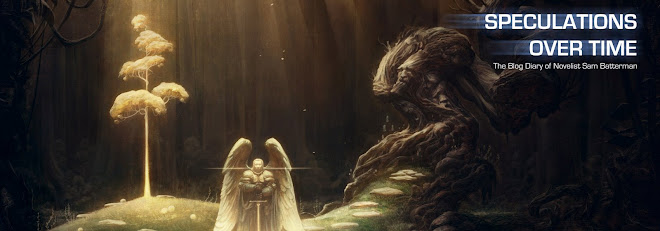Being a published author affords me many opportunities that I would never had experienced before. In the last month I've met three authors that are struggling through the same "find a publisher--finish the book" experience that I went through over a year ago. It's a frightening process that's very alien to people not working in the publishing industry (like me). It is great to share my experiences with them and try to encourage them to keep going. I hope they will.
A fellow author (and college alumnus) reviewed Wayback recently and posted it on his fine author blog. By permission, I'm re-posting it here. Adam is the author of Fatal Illusions, a thriller that takes place in Michigan's Upper Peninsula (or the UP as the natives call it). I hope to have a review on it soon.
My Review
I was delighted to read this new novel by author friend and fellow BJU alumnus Sam Batterman. I have always been fond of time travel stories and was especially interested to see how Sam would treat this classic but somewhat worn plot device. (From H.G. Wells to Michael Crichton, we've seen a wide spectrum of time travel sagas, not to mention numerous movies and TV shows.)
What I discovered was a novel that is really a carefully executed balancing act between suspenseful plotting, scientific research, and biblical truth. This technique is risky. Does the scientific information weigh down the plot? Are the biblical ramifications of what the story's characters experience lost in the plot? I thought Sam did a good job of striking the right balance, and he certainly put some hard work into this project. The list of sources Sam consulted for his bibliography is nothing short of amazing. This guy did his homework, and it shows!
Beyond the obvious creationism message, I was especially intrigued by scenes that describe the garden of Eden and Noah's ark. I've often wondered what the inside of Noah's ark looked like; Sam does a good job of giving readers an inside look. The main storyline of researchers sent back in time to the time of Noah's flood gains further complexity by a group of terrorists who plan to alter history in an unexpected way. I won't give away the subplot or their diabolical plans; you'll need to read the novel for yourself. The ramifications of their plans and how Sam probed the possible outcome of choices unique to two time periods definitely gave a new spin to the time travel concept that I hadn't thought of before. What a fascinating, thought-provoking read! With just enough hooks to keep the story moving forward while taking readers down a path of new possibilities and into a world we've read about in the Bible but only imagined, Wayback is definitely a worthy, suspenseful, and educational read. Definitely check it out!
Additionally, there should be a few other reviews coming in the next month or so.
I will be at Bob Jones University Campus Bookstore on December 4th for the "Light the Night" event and signing books from 7-9PM. If you are in the area, please stop by and say "Hi!"
I've started the second re-write of Maximal Reserve, my newest thriller, which I hope will be published in 2010. I have some early readers digging into it and I'm sure the story will only get stronger after they feedback to me. This novel is longer than Wayback and in some cases more complicated. I still have work to do, but I love the story so far. Can't wait to share it with you.
Blessings,
Sam
Sam


